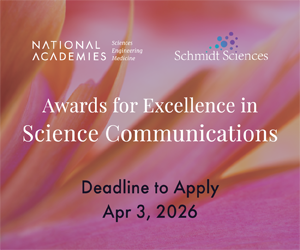This student story was published as part of the 2025 NASW Perlman Virtual Mentoring Program organized by the NASW Education Committee, providing science journalism experience for undergraduate and graduate students.
Story by Susanna Stevenazzi
Mentored and edited by Valerie Hruska
Successful aging has a lot to do with what we eat. How nutrition shapes aging is not only a matter of wellness but also crucial for decreased health care costs. Numerous scientific studies have demonstrated how a healthier diet could improve our wellness and prevent disease.
About 80% of older adults suffer from at least one chronic health condition, such as cardiovascular disease, type 2 diabetes and neurological disorders. Thus, it is of great relevance to understand what could improve people’s well-being as we age.
In February, a team of scientists from Harvard University published results from a 30-year study, which evaluated the diet of more than 100,000 people. The aim was to understand which diets can help achieve healthy aging, defined as reaching 70 years of age without suffering from chronic disease. In this study, men and women responded to questionnaires about their diet, and the researchers sorted the data into different categories of dietary patterns. The results indicate that, along with avoiding smoking, nutrition was the primary factor in preventing chronic non-infectious diseases, like diabetes, heart disease, cancer, and dementia.
Foods high in vitamins, minerals, fiber, and antioxidants showed strong benefits for successful aging, and consumption of unsaturated fatty acids and polyunsaturated fatty acids was particularly correlated with preserving cognitive function during aging. The odds of successful aging were 45% higher with dietary patterns rich in fruits, berries, vegetables, legumes, low-fat dairy, whole grains, and nuts. These odds doubled when the participant reached 75 years of age.
Consumption of red meat and processed meat, sugary beverages, high and regular fat dairy, high sodium intake, trans fat, and ultra processed foods displayed a negative correlation with the odds to live free of chronic disease and appears to be associated with a higher incidence of mental health conditions.
Fruits and vegetables, like the ones shown here, are staples of a nutritious diet because of their micronutrients and fibre content. Credit: Unsplash. Creator: CDCThis investigation is relevant because it confirms and reinforces the previous beliefs that nutritious diets can have a significant impact on an individual’s wellbeing. This study’s strengths include the large sample size and the long follow up period of the patients. These results are a clear guideline for improving people’s diet and preserving people’s well-being as they age.
Aging without developing chronic conditions can also decrease health care costs.
A 2023 review by the European University of Madrid highlighted the costs related to the main chronic diseases associated with a Western diet, characterized by high consumption of ultra-processed food, saturated fat, and meat. Cardiovascular disease-related healthcare costs amounted to $450 billion in the U.S. and $170 billion in Europe, while type 2 diabetes-related health care costs in the U.S. amounted to $550 million.
A key aspect of implementing these findings will be to educate people about the power of their diets and encourage them to make better choices for their long-term health, as well as prioritizing other healthy habits like regular physical activity, good sleep, and limited sedentary behaviour.
Health is not just the absence of disease. It also includes our ability to engage in everyday routines and relationships. When we are healthy, we have time to spend with our family and friends, and we can focus better on our job and hobbies.
Making strategic choices for healthy aging is a true investment that will pay in the future for yourself and for society.
Top image: Aging well is a combination of minimizing the impacts of chronic diseases while maximizing social connection and ability to engage in activities that bring us happiness. The foods we eat throughout our lives can help us achieve this. *Credit: Unsplash. Creator: Ryan Reinoso *
Susanna Stevenazzi is a student at Technische Universitaet Dresden. She studies Biology in Society, a unique program that focus on the relationship of science and economy, communication and politics. She worked as an intern at Trento’s University where she developed a podcast called CIBIO Talks and she had the chance to delve deeper into science communication.
Valerie Hruska is a science communicator with a background in human health and nutritional sciences. She holds three degrees (BSc, MSc, and PhD) and a certificate in Knowledge Mobilization from the University of Guelph.
The NASW Perlman Virtual Mentoring program is named for longtime science writer and past NASW President David Perlman. Dave, who died in 2020 at the age of 101 only three years after his retirement from the San Francisco Chronicle, was a mentor to countless members of the science writing community and always made time for kind and supportive words, especially for early career writers.
You can contact the NASW Education Committee at education@nasw.org. Thank you to the many NASW member volunteers who lead our #SciWriStudent programming year after year.
Founded in 1934 with a mission to fight for the free flow of science news, NASW is an organization of ~2,600 professional journalists, authors, editors, producers, public information officers, students and people who write and produce material intended to inform the public about science, health, engineering, and technology. To learn more, visit www.nasw.org.




